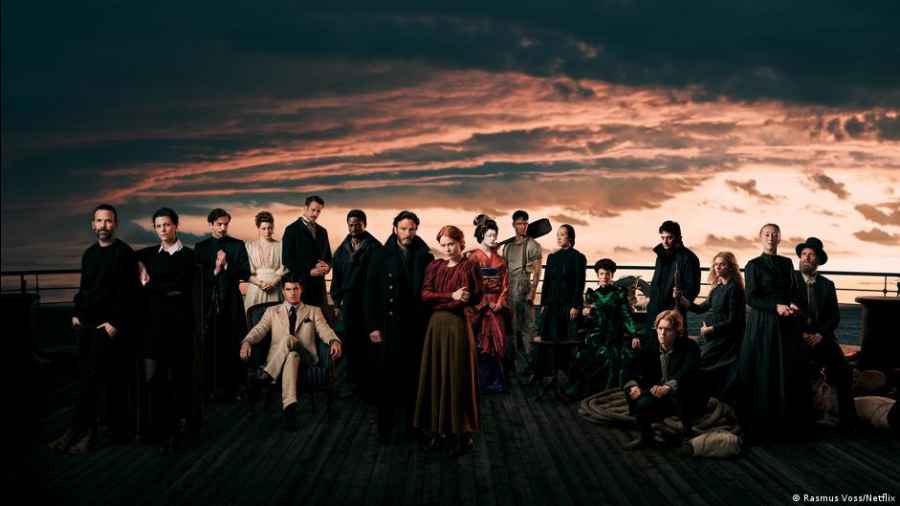Fans of the new Netflix series "1899" got a shock on Monday when the show's co-creators, Baran bo Odar and Jantje Friese — showrunners on Netflix mystery hit "Dark" — announced their new series had been cancelled after just one season.
"With a heavy heart we have to tell you that '1899' will not be renewed," read the pair's statement, posted on Instagram. "We would have loved to finish this incredible journey with a second and third season as we did with 'Dark.' But sometimes things don't turn out the way you planned. That's life."
For many, the news came out of nowhere. "1899" launched last November with a full-on media blitz, garnered sterling critical reviews worldwide and, according to Netflix's own charts, debuted at number 1 on the streaming platform in 55 countries.
An ambitious mystery series
Critics, and many viewers, praised the show's ambition. A twisty, meta-mystery about a group of 19th-century emigrants caught on a steamer ship bound for America, the show was shot in multiple languages, with the actors — including Germany's Andreas Pietschmann, Danish actor Lucas Lynggaard Tonnesen and Hong Kong star Isabella Wei — all speaking in their respective native tongues.
It was also a technical marvel: one of the first series to shoot on a LED-Volume stage, a cutting-edge form of digital special effects technology that allows directors to create complex visual effects in camera. The entire first season was filmed at the Dark Bay LED studio on the Studio Babelsberg lot outside Berlin.
Much like "Dark," "1899" was designed, according to its creators, to be a three-season show with a similar Russian doll structure. Every season was set to end on a cliffhanger that revealed a new layer to the story. Shutting up shop after season 1 leaves fans with a lot of unanswered questions and plenty of frustration.
Online protest shows strong fan base
So, as is common these days, many went online to protest, and demand Netflix reverse their decision. A #Save1899 Twitter account gained more than 27,400 followers within 24 hours and, within a matter of hours, a petition on Change.org to renew the show racked up more than 20,000 signatures.
"I neither understand nor accept #1899Netflix cancellation while it worked so well all over the world & has such a singular, interesting artistic identity," wrote one Twitter user. "If we cancel this kind of series, what do we leave? It's an insult to the audience & the crew. @netflix explain!"
Netflix, which is not in the habit of explaining of its creative or commercial decisions, is unlikely to give "1899" fans that satisfaction.
But the reason for cancelling "1899" is probably as commonplace as the show was complex: It did not reach Netflix's expectations in terms of viewership.
This could be because viewership figures for "1899" season 1 were below those of "Dark" season 3, or because not enough new subscribers signed up to watch the show — bringing in new subscribers is Netflix's primary goal. Critical praise and "top 10 charts" aside, "1899" was, by whatever metric Netflix bean counters were using, a flop. Or at least not successful enough to justify splashing out for a season 2.
It's worth remembering that while "Dark" was a come-from-nowhere surprise success — a low-budget German-language series that found a huge global audience — expectations for "1899," not least because of its much-higher budget, were huge out of the gate.
Could plagiarism accusations have played a role?
There's been speculation of a more sinister reason behind the show's cancellation. After "1899" dropped, Brazilian comic book artist Mary Cagnin claimed the series plagiarized her 2016 comic book, "Black Silence."
But literally every prominent film or TV series is hit with similar allegations and Cagnin's claims don't appear to have much legal validity. Aside from a few common tropes, including a multinational crew on a voyage — in "Black Silence" it's astronauts stranded in space, not migrants on a steamship —and an obsession with pyramids, it's hard to find many similarities between the two works.
Several popular Netflix series cancelled
The truth is, Netflix has become more cost-conscious.
Declining subscriber figures in the United States and slowing growth internationally combined with more competition in the form of Disney+ and HBO Max has forced the streaming platform to focus more on the bottom line.
"1899" isn't the only Netflix series with a strong fan following to get the ax recently.
"Resident Evil" was canned after a single season, "Warrior Nun" after two. These shows might resurface somewhere else — Netflix itself has revived cancelled series like "Arrested Development" and "Gilmore Girls" — but a rabid online following, in itself, is not enough to guarantee a season renewal.
What Netflix loves even more than fan adoration and critical praise is profits. If, after 8 episodes and two months online, "1899" didn't deliver enough to convince the higher ups the show was worth spending money on, well, that's life.











